Kerala’s Ambitious Organic Pledge
Air Date: Week of May 4, 2018
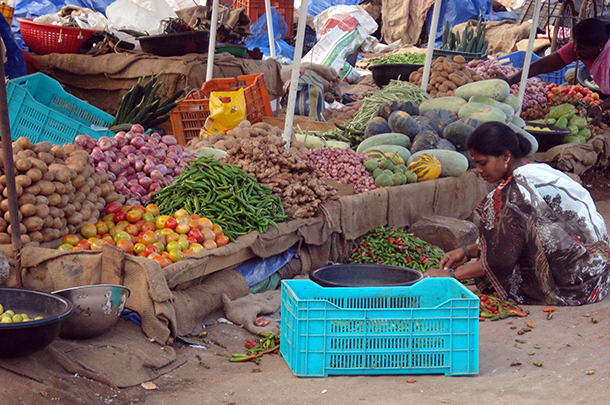
Most Kerala residents buy produce at large, open-air markets, where vegetables are typically grown using chemical fertilizers and pesticides. (Photo: Helen Palmer)
We kick off our series on the food and water challenges facing the tropical Indian state of Kerala. Rising rates of cancer there alarmed doctors and the public, and many blamed high levels of chemicals in food. So now there’s a government campaign to make Kerala’s food supply all organic by 2020. Living on Earth’s Helen Palmer takes a trip to Kerala to discover what’s involved.
Transcript
CURWOOD: It’s Living on Earth, I’m Steve Curwood.
Kerala could be Paradise. Tucked along the western side of the bottom tip of India, the state is always warm or hot, wet and luxuriant. Coconut palms fringe its beaches, and line its roads, crops grow year-round, and Keralans are among the best educated in the country, with a literacy rate of about 98%. It’s a traditional source of spices like cinnamon, nutmeg, pepper and cardamom, but today its biggest export is its people, who work in businesses and bureaucracies in the Middle East and remit money back home.
That cash has boosted Kerala’s financial economy, but it has also left it short of people to work the land. There is locally produced rice, but most of the food is imported and both rice and imports rely heavily on chemicals. Alarm at excess chemicals in food and rising cancer rates caused the Kerala government to pledge to go 100% organic by 2020. Living on Earth’s Helen Palmer took a trip there to check it out.
[MUSIC FROM GANESH TEMPLE IN TRIVANDRUM]
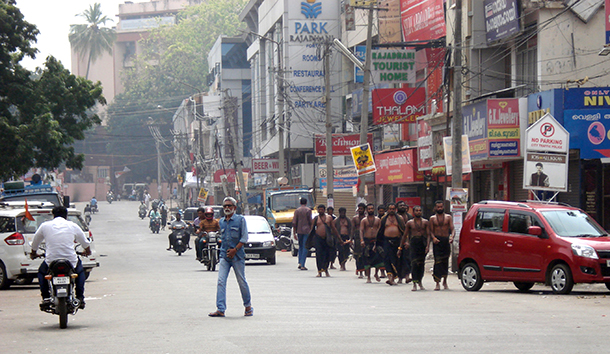
Helen Palmer visited Kerala’s capital Trivandrum during pilgrimage season. Devout Hindus travel long distances and walk barefoot in black dhothys to visit the Sri Padmanabhaswamy temple. (Photo: Helen Palmer)
PALMER: It’s pilgrimage season when I arrive in Kerala’s capital, Trivandrum. Streets are thronged with devout Hindus wearing black dhotis, the wide length of cotton cloth Indian men wear knotted round the waist. They trudge barefoot from the Central Railway station to the monumental Sri Padmanabhaswamy Temple, reputedly the richest in the world. To a visitor, it’s a reminder of the deep history and traditions still powerful in modern Kerala, which is actually dealing with a modern plague – rising rates of cancer widely blamed on pesticides and chemicals in food. Biju Prabakhar is director of Agricultural Development for Kerala.
PRABAKHAR: I was food safety commissioner of the state in 2010 to 2013 during which we have found that lots of pesticide residue are on vegetables, then antibiotics on meat and poultry. Or even some of the fish sellers or ice factory owners, they were keeping fish in formalin and ammonium sulphate and that kind of chemicals. So this was actually widely-publicized in the media that these kinds of spurious material are in our food and the medical community agreed this is one of main reasons for the cancer, because Kerala has a high incidence of cancer.
PALMER: In the three years up to 2016, cancer rates in Kerala rose over 10% faster than in most of the country, and two-thirds of cases prove fatal, due to a lack of specialized care. Biju Prabakhar says public anxiety, and the cancer link with pesticides in food, much of which is imported, is why there’s such urgency to become self-sufficient in local organic produce.
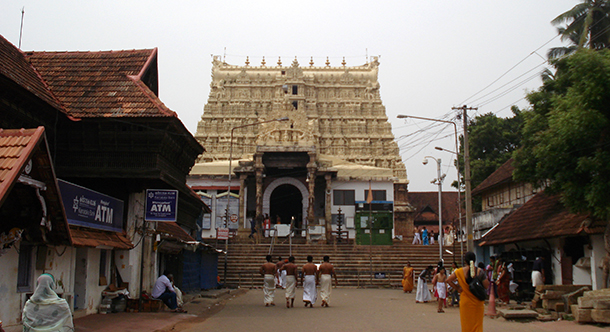
Pilgrims trade their black dhothys for plain white ones to enter the Vishnu Sri Padmanabhaswamy temple, reputedly the richest in the world with vaults full of gold and diamonds. (Photo: Helen Palmer)
PRABAKHAR: Now people are really aware about this and during last three to four years the production of vegetables has almost doubled, and we are trying to reach the target of nearly around 20 lakh, 200,000 tons of this vegetables to be produced over here – we are just short of that, 100,000. So this state is poised to convert itself to – not only vegetables, coconut, everything has to be certified without chemicals.
PALMER: Rice is the main local grain, and though Kerala traditionally grows 600 varieties, most commercial paddy fields are full of high yielding, hybrid strains grown with chemicals. Export crops – spices like black pepper, turmeric, and cardomom and commodities like rubber, coffee and coconuts, – occupy a third of the state’s agricultural land, and farmers favor them over labor intensive vegetables, partly because there’s a shortage of farm labor. That’s one result of Kerala’s low birth rate related to the high level of education, which also means there are better paying jobs to choose. And the state has other hurdles to boosting food production to meet its goal of going 100 organic by 2020. Kerala’s rice pot is a narrow, coastal plain sandwiched between the sea and the Western Ghats, thickly forested highlands in the west.
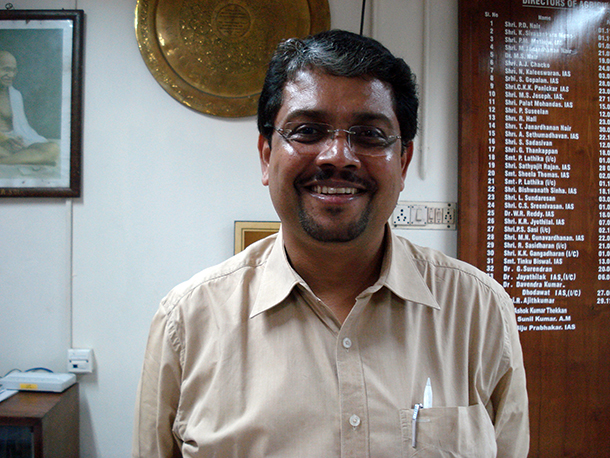
State Agricultural Development Director Biju Prabakhar is helping Kerala achieve 100% organic food by 2020. The rejection of chemicals in farming is in response to the perception that they are implicated in high rates of cancer. (Photo: Helen Palmer)
SHULAPANI: One major thing, which is needed, especially for the poor farmers, is land.
PALMER: Usha Shulapani, director of the sustainability non-profit, Thanal, says that shortage of agricultural land gets worse because fields are given as dowries when girls get married or is subdivided between the farmers’ sons – more than 92% of land holdings in the state are less than half an acre. So farms become too small to be economically viable, and since other jobs pay better, working on the land fell out of favor.
SHULAPANI: In last 10 to 20 years what is happening in Kerala is that because people were moving away from farming, most of the people who have land, they are into other occupations, so the land is lying fallow – so the people started seeing cheap land, so people with other interest come and buy.
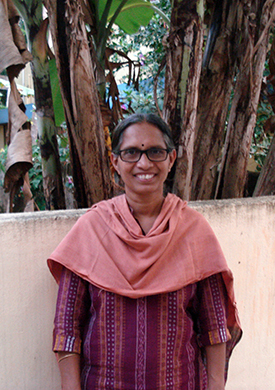
Usha Shupalani is the Executive Director of Thanal, a non-profit organization that seeks to raise awareness about sustainability and the environment. (Photo: Helen Palmer)
PALMER: This view of land as commodity has led to speculation, and urbanization, and a real estate boom that caters to Keralans returning from abroad with cash and looking for larger houses. On top of that, says Usha, there’s a problem with the agricultural leases for landless farmers – they’re too brief.
SHULAPANI: We need a policy for leasing, where the farmers, the poor farmers need to get land on a long-term basis, for five to 10 years like that, not for one year.
PALMER: With a one-year lease farmers have little incentive to improve the quality of the soil. Agriculture Director Biju Prabakhar says there’s a plan to ensure that land doesn’t lie fallow if an absentee landlord isn’t using it.
PRABAKHAR: So absentee farmers we’ll not allow not even a single land parcel to remain without cultivation. We are formulating that kind of a law which will encourage the leasing of land to other farmers, or farmer collectives or otherwise we are planning to have some kind of a taxation on those who are idling on the land. Ultimately, land is not the property of an individual, it’s the property of the state.
PALMER: Taxing or taking over fallow land is all part of the Communist State Government’s comprehensive “Green Kerala” program that covers everything from planting vegetable gardens in schools to composting food waste to create bio-gas. To help generate more income for farmers, Green Kerala mounted an ambitious “agripreneurship fair” at the former Maharajah’s Kanakakkunnu Palace, to showcase ideas to add value to everything – from coconut fiber for shoes and handbags to root vegetables. Technical Officer Safiya Shanavas of the Central Tuber Crop Research Institute points proudly a pile of unfamiliar knobbly roots of all shapes, sizes and colors – taro, cassava, yams – and tells me there are endless ways to use them.
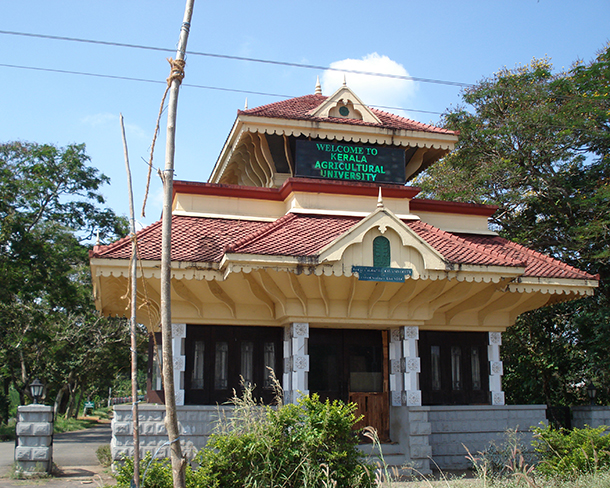
Kerala’s Agricultural University is responsible for providing the resources, skills, and technology required for the sustainable development of agriculture in Kerala. (Photo: Helen Palmer)
SHANAVAS: Whatever you can prepare with potato we are prepare with all tuber crops. Cassava chips we are having, sweet potato chips we are having, taro chips we are having, then we have noodles, then we have pasta.
PALMER: He tells me farmers can bring their crops to the Tuber Research Institute, which will use their fancy machines to turn them into jam and flour and snacks – cassava is gluten free, Shanavas tells me, and many of these roots are loaded with antioxidants. Indeed, that’s one thing I found most striking – every food, every spice anyone grows here seems to have some special health benefits – it fights cancer, it’s good for the heart. This focus resonates with the Indian tradition of Ayurvedic medicine – and some 30 years ago Kerala opened the world’s first Ayurvedic resort. Several stands at the fair celebrate “Jack, the wonder fruit.” It’s a massive spiky yellowish brown tree fruit – very fibrous, and versatile and very good, I’m told, for fighting diabetes.
JACK FRUIT VENDOR: From the seed we make cakes and the biscuits and from the spikes we make pickles, it’s very tasty and very spicy, OK, and we can make that wine. It’s actually banned in Kerala.
PALMER: No wine in Kerala?
VENDOR: No, there is wine, but it is illegal. From the pulp we can make juice, jams, squash a lot of things, halva.
PALMER: So jack fruit makes many many things?
VENDOR: Yes of course, around 3,000 products we can make it from jack fruit. :30
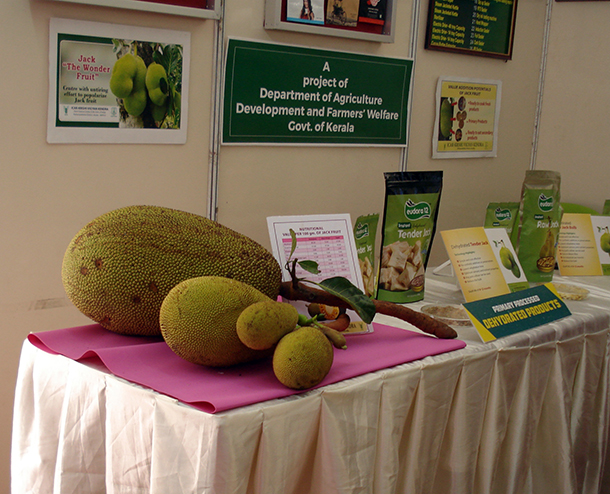
Advocates call it “Jack, the Wonder Fruit.” Jackfruit is an enormous, fibrous, versatile tree fruit that is used to make some 3,000 products, from cakes and jam to pickles and wine. (Photo: Helen Palmer)
PALMER: The palace is packed with curious Keralans keen to try free samples, and check out the displays of local fishes and biodiversity – one agriculture officer tells me it’s becoming very trendy now to be interested in growing food. But it’s no easy task to increase organic food production, and even the productivity of commercial rice is falling – partly due to problems with the soil itself.
Kerala’s earth is mostly acidic, so it needs lime. That tends to leach out with the heavy rainfall and feeding the soil properly is vital – but government subsidies don’t help the average farmer do that. Despite the ambitious long-term plans to help the switch to organic practices, the state’s yearly budgets are always squeezed. The subsidies only cover the cheapest form of nitrogen fertilizer, urea, and not the other major components of healthy soil that organic crops need, such as phosphorus and potassium. Thomas Anish Johnson is a soil survey officer who teaches at Kerala Agricultural University.
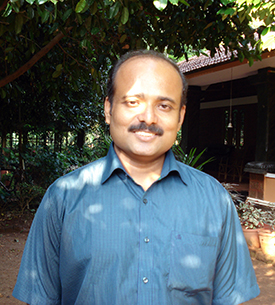
Government Soil Survey Officer Thomas Anish Johnson teaches at Kerala Agricultural University. He says crop yields are falling partly because poor farmers have difficulty improving Kerala’s acid soil and the state does not subsidize enough major nutrients. (Photo: Helen Palmer)
JOHNSON: The typical India Government subsidy is given for the major nutrients only, to the nitrogen fertilizers, that the urea is mainly subsidized and the other nutrients are being imported, so they are not given subsidy. Lime is also sometimes not given at a subsidized rate, so lime application is also not practiced mostly.
PALMER: Give me some idea of what the subsidized price for the fertilizer would be versus what has to be imported?
JOHNSON: So here the subsidized urea is given at around 5 rupees per Kg – while the other vital nutrients, that is phosphorus and potash around 20 – 25 rupees per kg – so that is 3 to 4 times the price of the urea.
PALMER: Without a thick layer of organic mulch to retain water, urea tends to make the soil MORE acidic, and not adding minerals – due to the cost -- helps create micronutrient deficiencies - lack of boron and magnesium, for example, affect crop quality and yield. Government figures show Kerala’s farmers are inefficient. More generous support could help them improve soil health, and the nutrient value of their produce, and that in turn could help public health, ultimately reducing the private and public expense of treating so many cancer cases.

There are many shrines on Trivandrum streets, and devout Hindus drape marigold garlands round those that honor Ganesha, one of the beloved Hindu deities. The elephant-headed god is known as the remover of obstacles, the patron of arts and sciences, and the ruler of intellect and wisdom. (Photo: Helen Palmer)
And Kerala’s Agricultural University is dealing with another headache that plagues farmers – a bumper crop of insects. The University’s a sprawling, leafy campus outside Thrissur, the cultural capital of Kerala, that’s dedicated to improving the state’s food, farmers’ methods and pest control.
Entomology professor Berin Pathrose, trim and bald with a moustache and glasses, tells me the state’s warm tropical climate means that harmful insects – literally – have a year-round field day. He shows off a bunch of them in a large display case in the hall outside his office.
PATHROSE: This section carries the pests of fruit crops – mango, banana, guava, jack, papaya, lychee, grapes etc etc. We have a major pest called mango stem borer –
PALMER: It’s very big – about an inch and a half!
PATHROSE: Yes more than that if you consider the length of its antennae. It can bore into the heavy trunk of mangos, it will kill the mango. In the citrus we have citrus butterflies – it's a very very good looking butterflies, then coming to the next section is the plantation crops, Kerala is known for several plantation crops – where we have coconut, cashew, coffee, areca nut, rubber, ginger etc.
PALMER: To combat all these harmful insects, Professor Pathrose specializes in bio-control agents, organic methods specific to each pest, but he tells me climate change and the insects’ ability to adapt, make it a constant cat and mouse game to keep up.
His plant pathologist colleague, Resmy Vijayaraghavan, a slim woman in a colorful sari, says the benefit of bio-control methods is that they not only build resistance in the plants, they help increase the harvest. Yet she doubts that Kerala can achieve its ambitious goals of totally organic food by 2020.
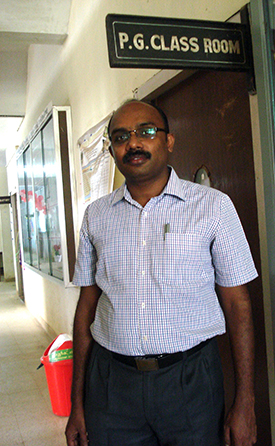
Entomology Professor Berin Pathrose specializes in bio-control agents at Kerala Agricultural University. But insects are masters at adapting to the changing tropical climate and Pathrose says it’s hard to keep pace. (Photo: Helen Palmer)
VIJAYARAGHAVAN: No actually, I wouldn’t support total organic cultivation because once the disease occurs no bio-contol agents are going to be effective. So in such cases you have to resort to chemical pesticides – so the halfway organic, halfway chemical pesticides, that is the only way out. If you go for organic cultivation, the farmers might strike with a big loss.
PALMER: She argues it’s particularly the main commercial crop, rice and spices like black pepper, nutmeg and cinnamon that need chemical treatments. But some traditional methods, such as intercropping, using locally adapted indigenous seeds and crop rotation, could help prevent infestations in the first place. Still, Kerala’s developed a whole cottage industry to make bio-control agents for the farm and home.
I drop in on the nerve center of one of the most energetic groups, headed by a cheerful determined woman in a brilliant blue and green tunic over bright green pants – who arrives on a motorbike.
[SOUND OF MOTORBIKE STOPPING]
RAJ: Helen?
PALMER: I am Helen. You are Asha Raj?
RAJ: Asha Raj.
PALMER: I am so pleased to meet you!
RAJ: Come on.
PALMER: She takes me to a Spartan, functional back room.
RAJ: I’m agricultural officer, I’m Asha Raj – my name is Asha Raj, and our Kerala government has sent me to national institute of plant health management, Hyderabad, for understanding about the various technique for on-farm production of biocontrol agents.
PALMER: Asha Raj brought that technical knowhow back from Hyderabad and now spearheads an SHG, a self-help group of women, many poor and barely educated, who make these bio-control mixtures at her office. It’s a modest, somewhat ramshackle building that doubles as a plant nursery. She says farmers might want to use fewer pesticides, but organic treatments still aren’t widely available and they cost too much, so she’s passing on what she’s learnt.
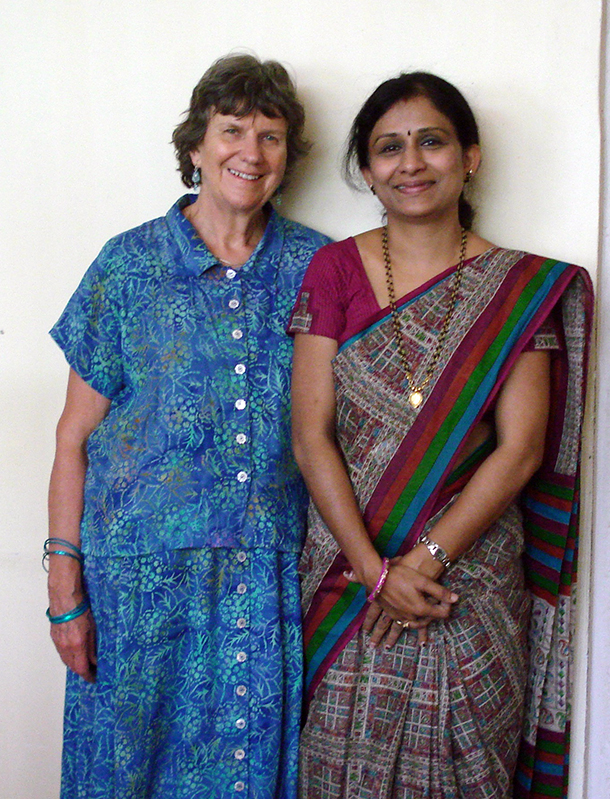
Plant pathologist Resmy Vijayaraghavan (right), with Living on Earth’s Helen Palmer (left). Vijayaraghavan says biocontrol agents are crucial to build resistance in plants and increase harvests, but chemical pesticides are still vital in cases of severe insect infestation. (Photo: Helen Palmer)
RAJ: Here we are training the farmers in such a mode that they can to produce these on-farm bio-control agents in their farm itself.
PALMER: She shows me the treatments they make – some feature concentrated cow urine, which she tells me can both kill insects and improve soil. Then there are bottles of bio-repellants with garlic and neem oil for pests like thrips, fruit fly traps powered by pheromones to protect cucumbers, jars of pseudomonas and trichloderma fungi that control soil pathogens.
RAJ: shall we go upstairs?
[FOOTSTEPS ON STEPS]
PALMER: Oh I see all your seedlings there!
[FOOTSTEPS]
PALMER: There are rows and rows of pots of plants – rice, tomatoes, eggplants, and peppers on the terrace, and Asha Raj tells me they inoculate the roots with helpful fungi called VAM – vesicular arbuscular mycorrhiza – to produce a biofertilizer that helps plants take up nutrients.
PALMER: And these are rice are they?
RAJ: Yes it’s rice, because in the fibrous root system VAM, it’s very much good to grow.
PALMER: So basically, this is stuff that you grow and then you give to the farmers or sell to the farmers?
RAJ: Yeah, this is being produced by our SHG and it is supplied to the farmers in the whole Trivandrum district.
PALMER: Asha Raj says she’s already trained dozens of farmers and it’s paying off for them – their organic crops now sell for prices at least 50% higher than conventional ones. But making those higher prices the reality for every farmer is a steep hill to climb.
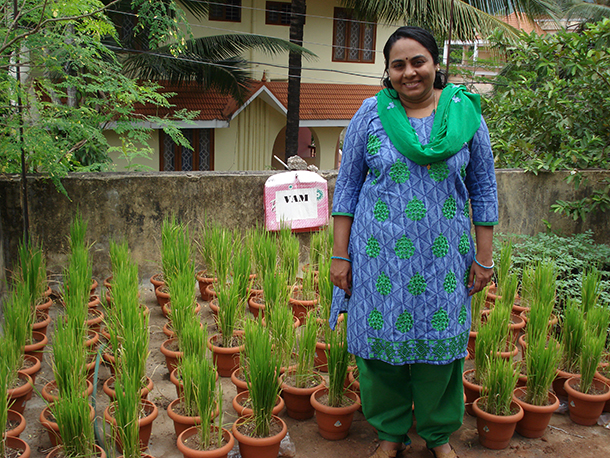
Agricultural Officer Asha Raj leads a group of women creating inexpensive homemade biocontrol agents, used to replace more toxic pesticides. (Photo: Helen Palmer)
Usha Shulapani of the non-profit Thanal says what financial help the government does offer needs to be firmly focused not on what’s being grown, but on the farmer.
SHULAPANI: Till now the whole policy was not farmer centric, it was crop-centric. Who needs to get the support is farmer, not the crop. We have to promote mix of cropping and also crop rotation for the farmers to become sustainable both economically and ecologically.
PALMER: Kerala’s Agriculture Director Biju Prabakhar is fine with supporting the farmers. But he says in the name of public health and their own health, people should be happy to pay higher prices for safe, nutritious food.
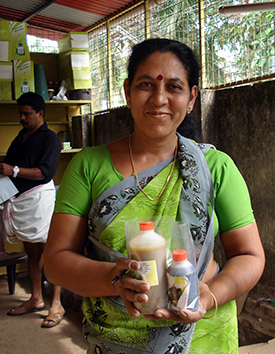
Above, one of the women Asha Raj has trained to produce bio-control agents: safer, organic and cheaper alternatives to industrial pesticides. (Photo: Helen Palmer)
PRABAKHAR: The farmers have to be subsidized, because they are the persons who are producing. The question is whether you’d like to pay more for foodstuffs, or whether you like to pay at least ten times in the hospital for treatment of some of the disease.
PALMER: And Usha Shulapani says another shift to make the organic goal a reality is reviving old indigenous varieties – they are more nutritious and can be a hedge against climate change – along with permaculture practices. I’m struck by how the solutions she says Kerala needs sound remarkably like the fixes organic enthusiasts recommend here in the US. Maybe in the end, since we have just one Earth, feeding and caring for the soil is the key to health and nutritious food for all of us, whether we pray to Vishnu or some other god.
[TEMPLE MUSIC, SINGING, PRECUSSION]
PALMER: For Living on Earth, I’m Helen Palmer in Trivandrum, Kerala.
Links
The Government of Kerala, India
Living on Earth wants to hear from you!
Living on Earth
62 Calef Highway, Suite 212
Lee, NH 03861
Telephone: 617-287-4121
E-mail: comments@loe.org
Newsletter [Click here]
Donate to Living on Earth!
Living on Earth is an independent media program and relies entirely on contributions from listeners and institutions supporting public service. Please donate now to preserve an independent environmental voice.
NewsletterLiving on Earth offers a weekly delivery of the show's rundown to your mailbox. Sign up for our newsletter today!
 Sailors For The Sea: Be the change you want to sea.
Sailors For The Sea: Be the change you want to sea.
 The Grantham Foundation for the Protection of the Environment: Committed to protecting and improving the health of the global environment.
The Grantham Foundation for the Protection of the Environment: Committed to protecting and improving the health of the global environment.
 Contribute to Living on Earth and receive, as our gift to you, an archival print of one of Mark Seth Lender's extraordinary wildlife photographs. Follow the link to see Mark's current collection of photographs.
Contribute to Living on Earth and receive, as our gift to you, an archival print of one of Mark Seth Lender's extraordinary wildlife photographs. Follow the link to see Mark's current collection of photographs.
 Buy a signed copy of Mark Seth Lender's book Smeagull the Seagull & support Living on Earth
Buy a signed copy of Mark Seth Lender's book Smeagull the Seagull & support Living on Earth

